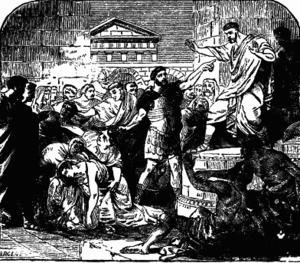Verginia
Verginia, or Virginia (ca. 465 BC–449 BC), was the subject of a story of ancient Rome, related in Livy's Ab Urbe Condita.[1][2]
The people of Rome were already angry with the decemviri for not calling the proper elections, taking bribes, and other abuses. It seemed that they were returning to the rule of the Kings of Rome who had been overthrown only a few decades before. In 451 BC, Appius Claudius began to lust after Verginia, a beautiful plebeian girl and the daughter of Lucius Verginius, a respected centurion. Verginia was betrothed to Lucius Icilius, a former tribune of the plebs, and when she rejected Claudius, Claudius had one of his clients, Marcus Claudius, claim that she was actually his slave. Marcus Claudius then abducted her while she was on her way to school. The crowd in the Forum objected to this, as both Verginius and Icilius were well-respected men, and they forced Marcus Claudius to bring the case before the decemvirs, led by Appius Claudius himself. Verginius was recalled from the field to defend his daughter, and Icilius, after threats of violence, succeeded in having Verginia returned to her house while the court waited for her father to appear. Claudius tried to have his own supporters intercept the messengers sent to summon Verginius, but they arrived too late to delay Verginius' arrival.

When Verginius arrived two days later he gathered his supporters in the Forum. Claudius, however, would not let him speak, and declared that Verginia was indeed Marcus Claudius' slave. Appius Claudius had brought an armed escort with him and accused the citizens of sedition. The supporters of Verginius left the Forum rather than cause any violence, and Verginius begged to question his daughter himself. Claudius agreed to this, but Verginius grabbed a knife and, at the Shrine of Venus Cloacina, he stabbed Verginia, the only way he felt he could uphold her freedom. Verginius and Icilius were arrested, and their supporters returned to attack the lictors and destroy their fasces. This led to the overthrow of the decemviri and the re-establishment of the Roman Republic.
Livy compared this story to the rape of Lucretia and the overthrow of the monarchy in 509 BC.
The tale is retold, with varying fidelity, in several works of Western literature, including Geoffrey Chaucer's "The Physician's Tale" in his Canterbury Tales, in Thomas Babington Macaulay's Lays of Ancient Rome, and in the play Appius and Virginia by John Webster and Thomas Heywood, which includes the following lines:
- Two ladies fair, but most unfortunate
- Have in their ruins rais'd declining Rome,
- Lucretia and Virginia, both renowned
- For chastity.
Verginia is also mentioned in Titus Andronicus and her story, with a twist, is also told in Steven Saylor's Roma.
Footnotes
External links
| Wikimedia Commons has media related to Virginia (Roman mythology). |

- “Virginia,” from Lays of Ancient Rome by Thomas Babington Macaulay (a fictional portrayal)
- "Virginia, or Verginia, in Roman legendary history, daughter of L. Virginius, a plebeian centurion". Encyclopædia Britannica (11th ed.). 1911.
- . Collier's New Encyclopedia. 1921.